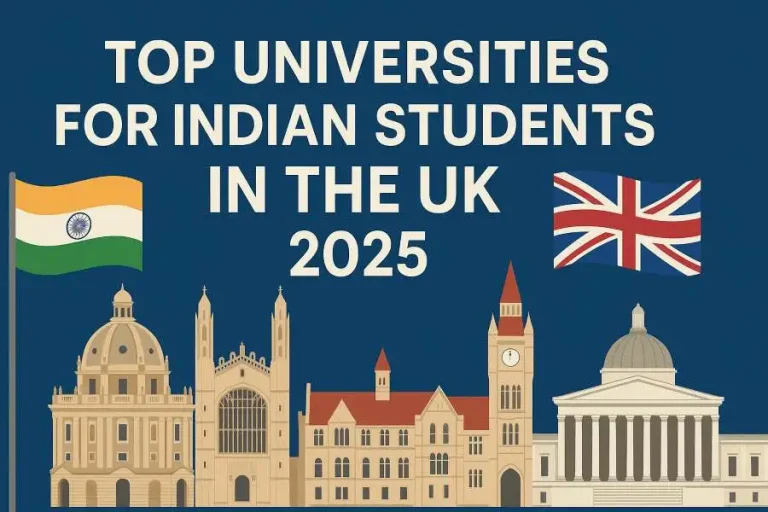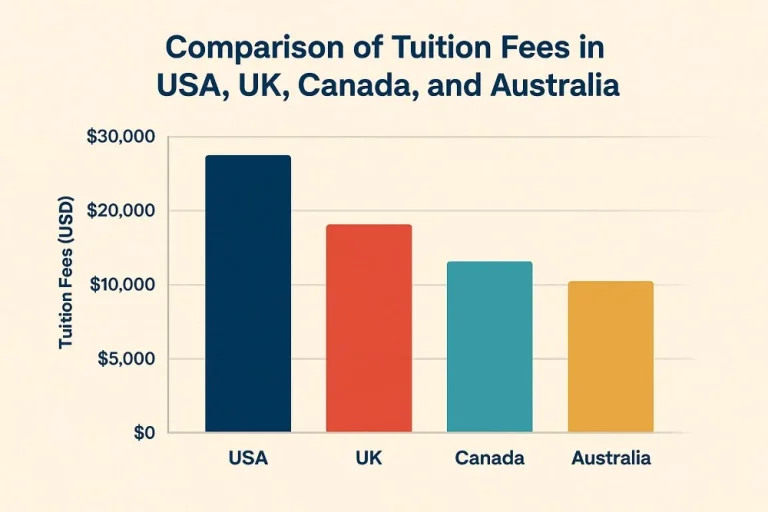A Record Number of Indian Students in the UK
Did you know that Indian students have overtaken all other nationalities in UK universities? In fact, India sent 126,600 students to the UK in 2022/23, more than ten times the number from India in 2017/18 commonslibrary.parliament.uk. By 2023/24, India remained the #1 source of international students in the UK with 166,310 Indian enrolments, far ahead of China (149,885) monitor.icef.com. This surge shows the UK’s popularity as a study destination for Indians. If you’re planning to join this wave in 2025, choosing the right course is vital for your future. This comprehensive guide will walk you through the best courses to study abroad in the UK for Indian students in 2025 – from popular undergraduate and postgraduate options, to top universities, key stats, and a step-by-step guide on selecting your ideal program. Let’s dive in!
Why Study in the UK in 2025?
UK Higher Education Excellence: The UK is renowned for its world-class universities and degrees that are respected globally. The country boasts several universities in the top 10 worldwide. For example, Imperial College London and the University of Oxford are ranked 2nd and 3rd globally in the QS World University Rankings 2024 topuniversities.com. With historic institutions like Oxford and Cambridge, as well as cutting-edge research universities, the UK offers academic quality that attracts students from around the globe.
Globally Recognized Degrees: A degree from a UK university can give Indian students a competitive edge. UK degrees are known for their rigorous curriculum and industry relevance. Whether you earn a bachelor’s in engineering or an MBA, your UK qualification is recognized and valued worldwide. Many courses in the UK are designed with input from industry leaders, ensuring you gain skills that employers seek (think of programs in fintech, AI, biotechnology, etc., that align with global job market trends).
Post-Study Work Opportunities: The UK’s Graduate Route (post-study work visa) allows international graduates to stay and work in the UK for up to 2 years (3 years for PhD holders). This is a huge advantage – you can gain international work experience right after completing your course. Many Indian students leverage this opportunity to start their careers in the UK or gain experience before returning to India. Coupled with the fact that over 60% of full-time postgraduates in the UK are international students monitor.icef.com, it’s clear that the UK welcomes global talent at advanced levels.
Cultural Diversity and Student Support: Studying in the UK means being part of a diverse, multicultural community. With the boom in Indian student enrollment, you’ll find active Indian student associations, cultural festivals (Diwali events on campus!), and familiar food options in many university towns. UK universities also offer robust support services – from academic tutoring to mental health counseling – to help international students succeed. You’ll feel at home while experiencing a new culture, truly getting the best of both worlds.
By the Numbers: Indian Students in the UK (Data Insights)

Chart: Growth in the number of Indian students in the UK vs. other top countries from 2019/20 to 2023/24. India’s trajectory (blue line) surged past China’s (green line), reaching around 170,000 students in 2023/24.
Understanding the trends and data can help you appreciate why certain courses and fields are in demand. Here are some key statistics about Indian students and popular courses in the UK:
India Leads in Student Enrollments: As mentioned, India is now the top source of overseas students in the UK. Over 166,000 Indian students were enrolled in UK universities in 2023/24 monitor.icef.com, reflecting the strong demand for UK education among Indians. This also means you’ll have a large peer network of fellow Indian students across UK campuses.
- Explosive Growth: The growth of Indian students has been dramatic – new Indian enrolments in 2022/23 were more than ten times the number in 2017/18 commonslibrary.parliament.uk. This trend is fueled by Indian students pursuing courses in technology, management, and other high-demand fields abroad. The UK’s welcoming policies and quality education have made it a favored destination.
- Most Popular Field of Study: Business-related courses are extremely popular in the UK. In fact, Business and Management was the most popular subject in 2023/24, accounting for about 21% of all student enrolments advance-he.ac.uk. In raw numbers, that’s huge – over 587,000 enrollments were in business and management courses in 2022/23 statista.com. This underscores how in-demand business programs are, both at undergraduate (BBA, B.Com, etc.) and postgraduate (MBA, MSc Management) levels, offering excellent career prospects.
These figures highlight the vibrant presence of Indian students in the UK and point to fields (like business) that attract large numbers. Now, let’s explore the top UK courses for Indian students in 2025 for both undergraduate and postgraduate studies.
Best Courses to Study Abroad in the UK for Indian Students (2025)
When we say “best courses,” we’re looking at a mix of popularity among Indian students, strong career potential, and the UK’s expertise in that field. Whether you’re a Class 12 graduate aiming for a bachelor’s or a college graduate seeking a master’s, here are some of the top UK courses for Indian students in 2025:
1. Business and Management (MBA, Management, Finance)
Why it’s popular: Business & Management consistently tops the charts for Indian students. The UK is home to world-renowned business schools – think London Business School, University of Oxford’s Said Business School, Cambridge Judge, and London School of Economics (LSE) for finance. Courses like MBA, Master’s in Management, Finance, Marketing, or undergraduate business degrees provide a global perspective and networking opportunities. The curriculum often includes case studies, internships, and industry projects, giving you practical exposure.
Career prospects: Graduates enter fields such as consulting, finance, marketing, entrepreneurship, and more. Major multinationals in London and other financial hubs actively recruit UK business graduates. Given that the UK is a global financial center, a degree in finance or management from the UK can open doors to roles in investment banking, consulting firms, and Fortune 500 companies. Many Indian students also use these degrees to pursue professional qualifications (like CFA or ACCA) alongside their course. With business and management making up 21% of all UK enrollments advance-he.ac.uk, it’s clearly a field with vast opportunities and resources.
Top Universities: University of Oxford, University of Cambridge, London Business School, LSE, University of Warwick, University of Manchester. (These institutions have highly ranked MBA or MSc programs and strong industry links in business and finance.)
2. Computer Science, IT & Artificial Intelligence
Why it’s popular: In the era of digital transformation, courses in Computer Science, Information Technology, Artificial Intelligence (AI) and related fields (Data Science, Cybersecurity) are in huge demand. The UK tech sector is robust – cities like London, Cambridge, and Edinburgh are tech hubs with thriving startup scenes and R&D centers. UK universities excel in computer science; for instance, the University of Oxford is ranked #1 globally for Computer Science in some rankings timeshighereducation.com. Whether at the undergraduate level (B.Sc. Computer Science, B.Eng. Software Engineering) or postgraduate level (M.Sc. Artificial Intelligence, Data Science, Cybersecurity), these courses offer cutting-edge curriculum. Many programs collaborate with industry (some have placement years or internships), giving you hands-on experience.
Career prospects: As a CS/IT graduate, you can pursue roles like software developer, data scientist, AI engineer, IT consultant, or cybersecurity analyst. The UK’s job market has strong demand for tech skills – from big names like Google, Microsoft, and Amazon (all of which have a UK presence), to fintech startups in London’s Silicon Roundabout. Indian students with a UK tech degree also find opportunities in India’s booming IT industry or other global markets. Essentially, an education in the UK’s tech fields equips you with a globally competitive skill set.
Top Universities: University of Oxford, Imperial College London, University of Cambridge, University of Edinburgh, King’s College London. (These universities rank highly in computer science and have extensive research output in AI, machine learning, etc.)
3. Engineering (Mechanical, Civil, Electrical, Aerospace, etc.)
Why it’s popular: Engineering has always been a preferred path for Indian students, and UK engineering degrees are highly respected. The UK has a rich legacy of engineering excellence – from the Industrial Revolution to modern innovations. Universities offer a range of specializations: Mechanical, Civil, Electrical & Electronics, Chemical Engineering, Aerospace, Environmental, and more. Many programs are accredited by professional bodies (like the UK’s Engineering Council), ensuring they meet high standards. For undergraduate students, a B.Eng or M.Eng in the UK gives strong theoretical fundamentals plus practical lab and design project experience. For postgraduates, specialized M.Sc. programs (e.g., in Renewable Energy Engineering or Artificial Intelligence Engineering) allow you to deepen your expertise in emerging areas.
Career prospects: UK-trained engineers are sought after worldwide. Opportunities exist in industries such as construction, automotive, aerospace, energy, and technology. For instance, mechanical and automotive engineers might find roles with companies like Rolls-Royce, Jaguar Land Rover, or BP. Aerospace engineers have prospects at companies like Airbus or BAE Systems. Additionally, having an engineering degree from the UK can facilitate professional recognition (some credits towards Chartered Engineer status). Many Indian engineering students also take advantage of the UK’s post-study work to get experience in the UK before either continuing with research (Ph.D.) or working in India’s engineering sectors (which value international exposure).
Top Universities: University of Cambridge, Imperial College London, University of Manchester, University of Bristol, University of Sheffield. (These institutions are known for strong engineering faculties; Cambridge and Imperial in particular are world-famous for engineering.)
4. Medicine and Health Sciences
Why it’s popular: Medicine, dentistry, and health-related courses are among the most competitive and prestigious in the UK. UK medical schools (like University of Oxford, University of Cambridge, University College London (UCL), King’s College London) are globally recognized for their research and training quality. For undergraduate medicine (MBBS), seats for international students are limited, but if you secure admission, you receive world-class clinical training and a degree valued worldwide. Apart from MBBS, many Indian students opt for postgraduate courses in healthcare – such as Master’s in Public Health (MPH), Hospital Management, Pharmacy, Nursing, or specialized research degrees – because the UK’s healthcare research (NHS system, clinical trials, etc.) is cutting edge.
Career prospects: Medical graduates from the UK can pursue licensing to practice in the UK (Foundation training) or return to India and take the Foreign Medical Graduates Exam (if doing MBBS). A UK medical or health degree also opens pathways in global health organizations, research institutions, or higher clinical training in other countries. For those in allied health or research, opportunities abound in pharmaceutical companies, biotech firms, hospitals, and NGOs. Plus, healthcare professionals generally enjoy high demand and stable career growth. (Do note that practicing as a doctor in the UK requires further exams and residency; however, having a UK degree is a strong foundation.)
Top Universities: University of Oxford, University of Cambridge, University of Edinburgh, King’s College London, University of Glasgow. (These have top-ranked medical schools or biomedical departments. Additionally, schools like University of Manchester and University of Birmingham are known for large, diverse medical programs with many international students.)
5. Law and Legal Studies
Why it’s popular: Law is a popular choice for Indian students who wish to gain a global perspective on legal systems. The UK’s common law system is the basis of Indian law and many other legal systems worldwide, so a law degree from the UK holds international value. Many students opt for an LL.M. (Master of Laws) in the UK after completing an LLB in India, to specialize in areas like International Law, Corporate Law, or Intellectual Property. There are also undergraduate LLB programs in the UK that some Indian students join (keeping in mind one might need additional steps to practice in India, but the exposure is invaluable). The allure is studying at historic law faculties and possibly networking with international peers and professors who are leaders in their fields.
Career prospects: UK law graduates find opportunities in global law firms, corporate legal departments, consulting firms, and NGOs. Even if you plan to practice in India, having a UK qualification (especially an LL.M. from a top school) can set you apart and give you expertise in specialized domains. Some graduates also work in international organizations (UN, World Bank, etc.) or pursue a Ph.D. in legal studies. Additionally, London is one of the world’s legal hubs – hosting top law firms where one can intern or gain work experience. The network and prestige associated with a UK law education can significantly boost one’s career in law.
Top Universities: University of Oxford, University of Cambridge, London School of Economics (LSE), University College London (UCL). (Oxford and Cambridge have famous law faculties; LSE and UCL are also highly regarded and located in London, offering great exposure. Other notable mentions: King’s College London and Queen Mary University of London for law programs.)
6. Data Science and Big Data Analytics
Why it’s popular: With data being dubbed “the new oil,” Data Science and Big Data Analytics have emerged as standalone popular courses (often overlapping with computer science, but worth mentioning separately due to demand). Many Indian graduates with an engineering or IT background choose the UK for a Master’s in Data Science/Analytics, Artificial Intelligence, or Business Analytics. The UK has invested in AI and data research (institutes like The Alan Turing Institute in London are at the forefront). Courses in this field equip you with skills in machine learning, statistical modeling, data visualization, and handling large datasets – all hot skills in today’s job market.
Career prospects: Data Science grads are among the highest-paid professionals in the UK tech scene. Companies across sectors – finance, tech, healthcare, retail – are hiring data analysts and scientists to drive decision making. In the UK, you could work for startups or established players like Facebook (which has AI labs in London), DeepMind (leading AI research firm), or any number of financial institutions using big data. Experience in the UK can also position you for roles back in India, where tech giants and startups alike have a high demand for data expertise. Roles include Data Scientist, Business Intelligence Analyst, Data Engineer, and AI Researcher.
Top Universities: Imperial College London, University of Oxford, University of Edinburgh, University of Manchester, University of Warwick. (These universities have strong computer science or stats departments offering specialized data science programs. Imperial and Oxford, for example, are known for AI and data research, and Warwick has a reputable Data Science MSc.)
7. Finance and Accounting
Why it’s popular: Given London’s status as a global financial capital, it’s no surprise that Finance and Accounting courses are highly sought after. Many Indian students target the UK for courses like Master’s in Finance, MSc in Accounting and Finance, Investment Banking, or even professional courses integrated with degrees. The UK offers both breadth and depth – you could study finance at a target school feeding into investment banks, or accounting in a program aligned with ACCA/Chartered Accountant pathways. The learning is often case-study based, covering real-world financial markets and practices. An added benefit: you’re right where the action is, with the London Stock Exchange, Bank of England, and countless financial institutions nearby for potential networking events or internships.
Career prospects: Graduates go on to roles such as Financial Analyst, Investment Banker, Asset Manager, or Risk Manager. Many join banks like HSBC, Barclays or firms in the City of London. Accounting grads might work in Big Four firms (Deloitte, PwC, EY, KPMG) – all of which have a strong UK presence. The UK’s financial ecosystem also includes fintech companies, insurance firms, and hedge funds, broadening the scope beyond traditional banking. With India’s financial sector growing, expertise gained in the UK (like familiarity with international accounting standards or global markets) is a big asset if you return home. Moreover, Indian students often use the time in the UK to complete parts of globally recognized certifications (CFA, CIMA, etc.) alongside their degree.
Top Universities: London School of Economics (LSE), University of Oxford, University of Cambridge, University of Manchester, University of Bristol. (LSE is world-famous for economics and finance; Oxford and Cambridge have top-tier finance programs; Manchester and Bristol also have strong reputations and large alumni networks in finance.)
8. Creative Arts, Design & Architecture
Why it’s popular: The UK’s influence in arts and culture is significant – making it a great place to study creative fields like Fashion Design, Graphic Design, Fine Arts, Music, Film and Media, or Architecture. Cities like London are global centers for fashion and the arts. Niche courses (for example, Masters in Fashion Management, or Film Production) attract Indian students who want a creative career with international exposure. The UK’s art and design schools emphasize portfolio development, creativity, and often have industry tie-ups (for instance, fashion students showcasing at London Fashion Week or film students interning at studios). For Architecture, the UK’s programs (usually 3-year undergrad + 2-year M.Arch structure) are respected and RIBA-accredited, setting you on the path to become a licensed architect.
Career prospects: Creative industries are thriving in the UK. Fashion graduates might work with luxury brands or start their own labels; design graduates enter fields like UX/UI design, advertising, or product design. Film and media students may find opportunities in the UK’s vibrant media industry – perhaps at the BBC, or in independent film production companies. Architecture graduates could work at renowned architectural firms (like Foster + Partners) or gain experience in historical preservation given the UK’s rich architectural heritage. Even if one returns to India, the international outlook and creative skills honed in the UK can differentiate you in competitive fields like fashion and media.
Top Institutions: Royal College of Art, University of the Arts London (which includes Central Saint Martins and London College of Fashion), University of Westminster (for media), University of Creative Arts, University of Edinburgh (has strong architecture program). (These institutions have produced famous designers, artists, and architects and offer excellent resources for creative students.)
9. International Relations, Politics and Social Sciences
Why it’s popular: For students interested in politics, diplomacy, or development studies, studying in the UK can be especially rewarding. The UK has a prominent place in global politics and a diverse international student cohort that enriches classroom discussions. Courses in International Relations, Political Science, Public Policy, or Development Studies attract Indian students who may aspire to careers in civil services, NGOs, or global organizations. The curriculum often covers contemporary global issues, diplomacy, economics, and provides analytical skills. Being in the proximity of think-tanks in London or even visiting bodies like the British Parliament can be an enlightening experience during your study.
Career prospects: Graduates often work in government (both UK or back in Indian administrative roles), join international NGOs, become policy analysts, or work with international bodies like the UN, World Health Organization, etc. Some also go into journalism or academia. For Indian students, the perspective gained from a UK social science education – especially exposure to students from many countries and debates on international policy – can be very useful for careers in foreign services or global corporate roles. The networking in these programs is valuable; you might be classmates with future diplomats or policymakers from around the world.
Top Universities: University of Oxford, University of Cambridge, London School of Economics (LSE), King’s College London, SOAS University of London. (These universities are highly reputed in politics and IR. LSE, for example, is known for producing world leaders and has strong programs in international relations and development.)
10. Hospitality and Tourism Management
Why it’s popular: The UK (and Europe in general) offers fantastic programs in Hospitality, Tourism, and Event Management. Indian students drawn to the service industry find that a UK qualification can open doors in global hotel chains and tourism companies. Courses cover everything from hotel operations to tourism marketing and event planning. The UK’s status as a tourist destination (think of all the international tourism in London, Scotland’s heritage, etc.) provides a living laboratory for hospitality students. Many programs offer internships or placements with hotels, resorts, or event management companies.
Career prospects: Upon graduating, you can pursue careers as hotel managers, event coordinators, travel consultants, or tourism board executives. Big hotel groups like Marriott, Hilton, or Taj (which also has presence in London) often recruit from UK hospitality schools. There’s also the opportunity to work in cruise lines, airlines (in management roles), or luxury event planning firms. Given the booming travel industry (in pre- and hopefully post-pandemic times), specialized knowledge in hospitality management is quite valuable. If returning to India, experience from the UK can be a plus in India’s luxury hospitality sector or travel startups.
Top Universities: University of Surrey, Bournemouth University, Oxford Brookes University, University of Strathclyde. (Surrey is well-known for hospitality and tourism programs, often ranking top in this field; Bournemouth and Oxford Brookes also have strong industry-focused courses.)
These ten course areas cover a broad range of interests. Of course, there are many other excellent courses (from psychology to literature to sports science) that Indian students pursue in the UK. The key is to align your choice with your passion and career goals. Next, let’s look at some of the best universities in the UK for Indian students, and then how to decide which course is right for you.
Best Universities in the UK for Indian Students
The UK has an abundance of great universities, but “best for Indian students” can depend on what you value – academic ranking, support systems, or alumni network. Here are a few top universities that Indian students highly prefer, known for both academic excellence and an environment that welcomes international students:
- University of Oxford – Consistently at the very top of global rankings, Oxford is famous across disciplines (from humanities to science). It has a large international community and active Indian student societies. Oxford’s tutorial system provides personalized attention. (Fun fact: Oxford was ranked among the top 5 globally by QS in 2024 topuniversities.com, underscoring its prestige.)
- University of Cambridge – Oxford’s historic rival, Cambridge is equally prestigious, especially strong in sciences, engineering, and business (Cambridge Judge Business School). Cambridge too ranks in the world’s top 5 and produces a high number of Nobel laureates and industry leaders. The campus town is idyllic and very student-friendly.
- Imperial College London – A powerhouse for STEM (Science, Technology, Engineering, Math), Imperial is located in London and has a cutting-edge focus on engineering, medicine, and business. It was ranked 2nd globally in the QS 2024 rankings topuniversities.com, reflecting its outstanding academic reputation. For Indian students interested in tech or engineering fields, Imperial is a top choice.
- University College London (UCL) – UCL is another top London university, known for its research output and a wide array of courses (from law and architecture to neuroscience). It’s very multicultural and located in the heart of London. UCL often ranks in the global top 10 and has produced many distinguished alumni.
- London School of Economics (LSE) – A haven for those inclined towards economics, finance, politics, and social sciences. LSE is world-renowned in these domains and boasts a very international student body (including many from India at postgraduate level). If you’re eyeing a career in finance or public policy, LSE’s name carries weight.
- University of Edinburgh – The most prestigious university in Scotland, Edinburgh is popular for courses like computer science, AI, and humanities. The city of Edinburgh is beautiful and more affordable than London, and the university has a strong international community. Edinburgh consistently ranks among the world’s top 20-30 universities and offers a rich student life.
- University of Manchester – A favorite among Indian students, Manchester has a large South Asian community and is known for its strong programs in business, engineering, and science. It’s a Russell Group university (UK’s Ivy League equivalent) and has one of the largest student populations in the UK. Notably, Manchester is ranked in the world’s top 40 by QS topuniversities.com and is respected for its research.
- University of Warwick – Warwick has built a strong reputation in business (Warwick Business School), economics, and engineering. It’s known for its beautiful campus and international outlook – nearly half its students and staff are from abroad topuniversities.com. Warwick actively partners with industries and offers a very modern approach to higher education, which appeals to many career-focused students.
- These are just a few examples. Other honorable mentions include King’s College London (excellent for health sciences and law), University of Bristol (engineering and humanities, plus a vibrant student city), University of Birmingham, University of Leeds, and University of Sheffield – all of which have significant Indian student communities and strong programs. The bottom line is that the UK’s top universities combine academic prestige (high rankings, Nobel laureates, research output) with robust support systems for international students (language support, career counseling, cultural societies). As an Indian student, you’ll find that these universities not only push you academically but also celebrate diversity and inclusion, making your transition smoother.
(Tip: When researching universities, look up their world rankings in your field of interest, and also check student reviews or ask alumni about the campus environment. Sometimes the “best” university is one that fits your specific needs and where you feel comfortable.)
How to Choose the Right Course: Step-by-Step Guide
With so many great courses and universities, how do you decide what’s best for you? Follow these steps to make an informed decision:
- Self-Assessment – Know Your Interests and Goals: Start by reflecting on your passion, strengths, and career ambitions. Do you love coding and computers, or are you more inclined towards managing a business? Perhaps biology fascinated you in school, or you’ve always dreamed of designing buildings. List the subjects or industries you are genuinely interested in. Also consider your long-term goals – do you want a high-paying job quickly, or are you aiming for a research or academic career? Your interests and goals will form the foundation of choosing the right course.
- Research the Course and Industry Demand: Once you have a field in mind, research the specific courses and their scope. Look at the curriculum of programs in that field – do the modules excite you? For example, a Data Science course might include machine learning, big data, and Python programming. Make sure that aligns with what you want to learn. Simultaneously, research the industry demand: check job market trends for that field in the UK and globally. (Our data above shows fields like technology and business are in high demand.) Ensure the course you choose has strong career prospects in 2025 and beyond. It’s also helpful to read student testimonials or speak to current students if possible – they can give insight into how the course really is and what graduates end up doing.
- Check Entry Requirements and Eligibility: Different courses and universities have varying entry criteria. Verify the academic requirements, tests, and prerequisites for your shortlisted courses. For undergraduate programs, this could be certain Class 12 marks or specific subject requirements (e.g., some engineering courses may require Physics and Math in Class 12). For postgraduate courses, check if they require a relevant undergraduate degree, any entrance exams (GRE/GMAT for some programs, or portfolios for design courses), or work experience (MBA programs often prefer 2-3 years of work experience). Also note English proficiency tests like IELTS/TOEFL requirements. This step is crucial to avoid applying to places where you might not be eligible. If you find you’re missing a requirement, you can sometimes take a foundation course or an exam to meet it.
- Consider Course Structure, Duration, and Cost: Different courses have different structures – some include internships or sandwich years, some are thesis-based, some are course-work heavy. Consider what works best for your learning style. Also, note the course duration: most UK master’s programs are 1 year (which is great to save time and cost), while bachelor’s are typically 3 years (or 4 years in Scotland or with a placement year). Factor in the tuition fees and living expenses as well. Calculate a rough budget and see if scholarships or part-time work opportunities are available. For example, an MBA in the UK can be expensive, but many schools offer scholarships for international students. Evaluate the Return on Investment (ROI) – will the likely salary after graduation justify the costs? Keep in mind, the post-study work visa can help you earn in the UK after graduating, which can offset some of the costs through income.
- Shortlist Universities and Seek Guidance: Based on the above steps, make a shortlist of, say, 5-8 courses/universities that fit your criteria. Now, seek advice to finalize. Talk to education counselors or mentors, connect with alumni or current students via LinkedIn or university forums, and discuss with family. Sometimes guidance from someone experienced can illuminate things you hadn’t considered (like campus culture, weather, or job placement support). If you’re unsure between two courses – for instance, an MS in Data Science vs an MBA – a counselor could help weigh the pros and cons relative to your career goal. This is also the stage to attend university webinars, education fairs, or book a free consultation with Uninist (more on that below) to get expert advice. Don’t rush – choosing the right course is a big decision, and gathering as much insight as possible will help you make a confident choice.
Following these steps will ensure you choose a course that not only excites you academically but also sets you up for a successful career. Remember, there isn’t one “perfect” course for everyone; it’s about finding what’s perfect for you.
Start Your UK Study Abroad Journey
By now, you should have a clear picture of the best courses to study in the UK for Indian students in 2025 and what makes the UK such an attractive destination – be it the top-notch universities, the in-demand programs, or the vibrant international student life. The UK offers Indian students a world of opportunities, whether you’re aiming to become a tech innovator, a business leader, a cutting-edge researcher, or a creative professional. With careful planning – assessing your interests, researching data-driven insights, and seeking the right guidance – you can find a course and university that will shape your future for the better.
Ready to take the next step? Book a free consultation with Uninist today and let our experts help you plan your study abroad journey. From choosing the right course to finding accommodation in the UK, Uninist is here to support you at every step. Don’t just dream about studying in the UK – make it happen with a solid plan and the right guidance. Good luck, and here’s to your success in 2025 and beyond!
Sources
- House of Commons Library – International students in UK higher education (2024) commonslibrary.parliament.uk
- ICEF Monitor – International enrolment trends 2023/24 monitor.icef.com
- QS World University Rankings 2024 – UK University Rankings topuniversities.com
- Statista – UK university enrollments by subject 2022/23 statista.com
- Advance HE (HESA data 2023/24) – Most popular subject areas advance-he.ac.uk
- Times Higher Education – World University Rankings by Subject 2024 (Computer Science) timeshighereducation.com
FAQ
What are the best courses to study in UK for Indian students?
The most popular and rewarding courses for Indian students include Computer Science, Business Management, and Engineering. These programs offer excellent career prospects with starting salaries of £25,000-£40,000 and high employment rates of 85-95% within six months of graduation.
How much does it cost for Indian students to study in UK?
Total annual costs range from £25,000-£50,000 including tuition (£15,000-£35,000) and living expenses (£10,000-£15,000). London is more expensive, while northern cities offer better value. Scholarships and part-time work can significantly reduce these costs for international students.
Is studying in UK worth it for Indian students in 2025?
Yes, UK education offers excellent return on investment. With shorter course durations, 2-year post-study work visa, and 90% graduate employment rates, most students recover their investment within 3-5 years while gaining globally recognized qualifications.
What are UK university admission requirements for Indian students?
Most UK universities require 75-85% in Class 12 for undergraduate programs and 65% in bachelor’s degree for postgraduate courses. You’ll also need IELTS 6.0-7.0, financial proof, and supporting documents like transcripts and recommendation letters.
Which UK universities are easiest to get into for Indian students?
Universities with higher acceptance rates include Coventry University, University of Bedfordshire, and Birmingham City University. These institutions typically require 70-75% academic scores and IELTS 6.0, making them accessible options for international students seeking quality education.
Can Indian students get jobs in UK after graduation?
Yes, 85-95% of Indian graduates find employment within six months. The Graduate Route visa allows 2-3 years of work authorization post-graduation. Popular sectors include technology, finance, and healthcare with competitive starting salaries of £25,000-£45,000.
What scholarships are available for Indian students in UK?
Major scholarships include Chevening (full funding), Commonwealth Scholarships, and GREAT Scholarships (£10,000). University-specific merit scholarships range from £2,000-£15,000. Early applications and strong academic records significantly improve your chances of receiving financial aid.
How long does UK student visa processing take for Indians?
Standard processing takes 15-20 working days from India. Priority service reduces this to 5-10 days for additional fees. Start your visa application 6-8 weeks before your course begins to ensure sufficient processing time.
When should Indian students apply to UK universities?
Apply between October-January for September intake. UCAS deadline is January 15 for most courses, October 15 for Oxford and Cambridge. Early applications receive better consideration for competitive programs and scholarship opportunities.
Where should Indian students live while studying in UK?
Purpose-built student accommodation offers the best balance of safety, community, and convenience for international students. Costs range from £100-£250 weekly depending on location. University halls and private student housing are most popular among Indian students.








